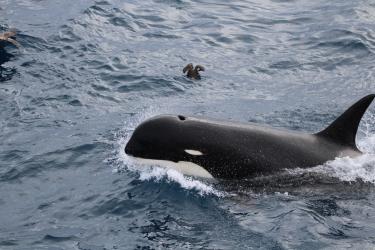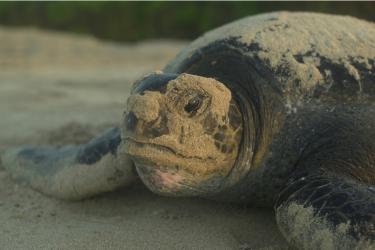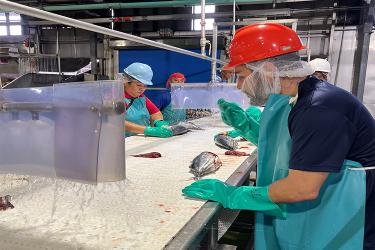Illegal and inhumane working conditions in the seafood sector are not only devastating for the victims and their families, but also contribute to destabilization of maritime security and supply chains, as well as the degradation of fisheries and broader marine ecosystems. NOAA Fisheries recognizes the need to ensure that workers across the supply chain have access to legal, safe, and healthy working conditions.
The international framework to promote legal and safe conditions in the seafood industry is supported by the International Labor Organization, the International Maritime Organization, and the Food and Agriculture Organization. The United States is actively engaged in each of these organizations, promoting effective standards, such as transparent recruiting practices, fair wages, and occupational safety and health protection.
Promoting Action in International Organizations
NOAA Fisheries, in cooperation with interagency partners, is advocating for the strengthening of global guidance on labor standards at the Food and Agriculture Organization of the United Nations, including the development of guidance for industry to promote social sustainability across its supply chains. We are also leading, or are key voices, in discussions at regional fishery management organizations, including the Western and Central Pacific Fisheries Commission and the International Commission for the Conservation of Atlantic Tunas, to ensure that workers in members’ fleets have access to safe and legal working conditions, including ending forced labor.
Ensuring Goods Made with Forced Labor Do Not Enter U.S. Markets
NOAA Fisheries is part of a comprehensive U.S. Government effort to combat illegal labor practices, including forced labor, in fisheries, in concert with the Departments of Homeland Security, Justice, Labor, and State. For example, we work with Customs and Border Protection and other agencies to support the identification of potential forced labor practices and violations aboard fishing vessels, as well as products that may have been produced using forced labor. CBP can subsequently prevent merchandise produced in whole or in part in a foreign country using forced labor from being imported into the United States.
Coordinating Government Agencies Addressing Labor Issues in Fisheries
The Maritime SAFE Act required the formation of an Interagency Working Group on Illegal, Unreported or Unregulated Fishing. The Sub-Working Group on Labor in the Seafood Supply Chain, including Forced Labor, was established in 2021 as a subsidiary working group to focus on labor concerns. The Sub-Working Group’s mission is to develop and facilitate a comprehensive U.S. government response to identify and address labor abuses, including forced labor, in the fishing industry. Currently, the Sub-Working Group is making progress on addressing recommendations from several reports to Congress. These include:
- Department of State’s and NOAA’s Human Trafficking in the Seafood Supply Chain Section 3563 of the National Defense Authorization Act for Fiscal Year 2020 Report to Congress
- Department of Justice’s 2021 “Task Force on Human Trafficking in Fishing in International Waters” Report to Congress
Public-Private Partnership: Collaborative Accelerator for Lawful Maritime Conditions
NOAA Fisheries recognizes the shared role of government and civil society in preventing illegal and harmful labor practices in the seafood supply chain, as well as promoting legal, safe, and healthy working conditions for workers in the fishing industry.
NOAA leads an initiative known as the Collaborative Accelerator for Lawful Maritime Conditions in Seafood (CALM-CS,and pronounced "calm seas”). CALM-CS brings together key voices from across the seafood sector to collaborate and accelerate progress on key initiatives so that all workers across the seafood sector have access to safe, healthy, and legal workplaces, from aboard vessels to on docks to shoreside processing.
NOAA and the U.S. government strongly value the importance of workers’ voices within these processes. We are committed to ensuring that this work is inclusive of workers and worker’s unions, and their perspectives.
Learn more about CALM-CS. We encourage participation from all stakeholders. You can request more information by emailing calm.cs@noaa.gov.



